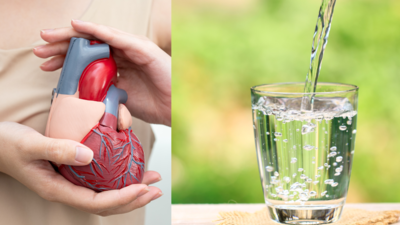Chronic illnesses like stroke and cardiovascular disease continue to rank among the leading causes of death worldwide. Medical advancements have brought in better treatment, researchers are turning their attention to more simpler, everyday habits that could potentially play a powerful role in prevention.Recent scientific studies are shedding light on a common drink that may do more than just quench thirst, it appears to support blood pressure, protect heart tissue and even lower the most life-threatening vascular conditions, and it is none other than, Water!Two studies are landmarks in understanding this relationship. One is an extended view of how hydration might influence cardiovascular death. The other looks at short-term blood pressure and cardiac function variability following water consumption. Together, they offer an optimistic but still developing picture of how hydration might benefit the heart and brain.
What long-term research suggests

A recent systematic review and dose-response meta-analysis examined the long-term effects of total water and drinking water intake on mortality from all causes and cardiovascular disease (CVD). The study combined data from seven prospective cohort studies, covering over 116,000 participants followed for up to 19 years.Individuals who consumed more total water had a lower risk of death from cardiovascular disease.Each additional cup of total water per day was linked to a:3% lower risk of death from CVD2% lower risk of death from any causeWhile simply drinking more water may not directly reduce the overall risk of death, higher total water intake appears to play a protective role against cardiovascular disease mortality. This supports the idea that staying hydrated could be an important part of maintaining heart health over time
The short-term cardiovascular effects of water

Additional direct evidence comes from a 2025 study reported in National Health and Nutrition Examination Survey. This experiment tested for immediate cardiovascular responses in healthy adults after being given one glass of water (355 mL).Results showed a major decrease in systolic blood pressure and decrease in heart rate shortly after consumption. The effects were observed in an hour and reflected an increased regulation of the autonomic nervous system. Though the effects were temporary, they reflect on the role of hydration in facilitating support of heart function under everyday living conditions.Temporary reductions in blood pressure, even minimal ones, decrease the heart’s workload. For people susceptible to hypertension or cardiovascular stress, this daily habit might offer daily relief. The study also gives validity to the belief that water is not only harmless but actually beneficial.
Why staying hydrated is important

Virtually all major body systems benefit from proper hydration. From a cardiovascular and neurological perspective, it helps with:
- Supporting the normal blood volume and viscosity
- Increasing circulation and nutrient transport
- Reducing the workload on the heart
- Preventing clotting by smoothing blood flow
- Supporting kidney function, which helps regulate blood pressure
Dehydration reverses all of these, causing the blood to become more viscous, raising heart rate, and potentially increasing the risk for vascular strain. It may also induce headache, fatigue, and light-headedness, which indirectly lead to lifestyle choice that impacts long-term health.
Water as a better alternative
While sweetened drinks, excessive caffeine, and alcohol place other stresses on the body, water is calorie-free, anti-inflammatory, and metabolically inert. Replacing these drinks with water improves hydration but also reduces other cardiovascular disease risk factors such as weight gain, insulin resistance, and inflammation.











